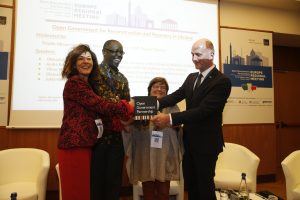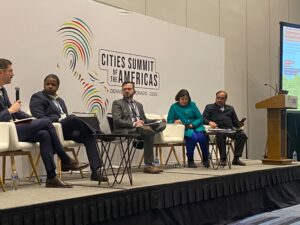Why Cities are at the Forefront of Openness
Por qué las ciudades están a la vanguardia de la apertura
As we face challenges that affect our democracies—such as the climate crisis, a global pandemic, regression of civic freedoms, and more—the need to integrate a local perspective to identify innovative solutions to the most pressing issues cities face is more evident than ever.
The first Cities Summit of the Americas was designed with this in mind, bringing together over 2,000 individuals from local governments, civil society organizations, international organizations, academia, and the private sectorGovernments are working to open private sector practices as well — including through beneficial ownership transparency, open contracting, and regulating environmental standards. Technical specificat... More. The Summit created spaces to exchange ideas and experiences among local government leaders and other sectors on various policy areas, including climate and environment, finance and investment, democracy and inclusionOGP participating governments are working to create governments that truly serve all people. Commitments in this area may address persons with disabilities, women and girls, lesbian, gay, bisexual, tr... More, digital governanceAs evolving technologies present new opportunities for governments and citizens to advance openness and accountability, OGP participating governments are working to create policies that deal with the ... More, and more.
Here are three reasons why cities and other local jurisdictions are leading the way in openness:
They co-create public policies: Cities like Buenos Aires (Argentina), Los Angeles (USA), Quintana Roo (Mexico), Peñalolén (Chile), and Santo Domingo de Tsáchilas (Chile) are working on reforms that contribute to governments strengthened by solutions co-created with civil society organizations.
During the Summit, mayors, secretaries, and executive directors of civil society organizations representing these jurisdictions emphasized the need for greater citizen involvement to generate concrete and better-performing actions for change, andto ensure their sustainability, going beyond administrative changes. Recent research indicates that when government commitments are co-created with citizens, reforms tend to be more ambitious and have a greater impact.
They innovate to address future challenges: Cities like Bogota (Colombia) are leading the way in addressing migration by granting temporary protection permits, and ensuring immigrants have access to fundamental rights and basic services.
Several cities shared strategies they are implementing to address climate change. Scotland (UK) and Buenos Aires (Argentina) are also promoting a community of practice to share reforms that tackle the crisis from a comprehensive perspective. We invite you to participate in the upcoming gathering here.
During the Summit, urban development and housing initiatives were also highlighted, such as The Shift’s work on adequate housing in Canadian municipalities. Other cities are addressing this issue through open data and evidence to develop public policies that ensure access to decent housing, particularly for individuals experiencing homelessness.
They advance transparency and accountability: These fundamental values of open government were exemplified through the initiative led by Karewa, a civil society organization and member of the multi-stakeholder forum of the Municipality of Chihuahua, Mexico. They successfully opened up information about public procurementTransparency in the procurement process can help combat corruption and waste that plagues a significant portion of public procurement budgets globally. Technical specifications: Commitments that aim t... More and made the process of awarding contracts and expenditures more transparent. This is clearly a mechanism that contributes to the fight against corruption, a topic addressed by mayors, ambassadors, and representatives of international organizations during the Summit. They also emphasized the connections between various levels of municipal corruption and how governments, the private sector, and civil society can work together to combat them through transparencyAccording to OGP’s Articles of Governance, transparency occurs when “government-held information (including on activities and decisions) is open, comprehensive, timely, freely available to the pub... More and other means.
What’s next?
Local government members of the Open Government PartnershipThe Open Government Partnership (OGP) is a multi-stakeholder initiative focused on improving government transparency, ensuring opportunities for citizen participation in public matters, and strengthen... More (OGP) have produced some of the most innovative and citizen-focused reforms in recent years. In its new strategy for the next five years, OGP aims to sustainably grow OGP Local as a cohort of champions and innovators leading ambitious open government reforms and inspiring action elsewhere. Membership processes will be open to local jurisdictions from participating and eligible OGP countries.
In the words of U.S. Secretary of State Antony Blinken, “Cities, when you come down to it, are where democracy is closest to its people. And when cities are responsive to the needs of residents, they demonstrate democracy’s greatest strength: its ability to improve on itself, to empower citizens to hold their leaders accountable, to try out different solutions, and to allow the best ideas to rise to the top.” This agenda will continue to be strengthened through the “Cities Forward” initiative and the upcoming summit in the Dominican Republic in 2024.
A medida que hacemos frente a los retos que afectan a nuestras democracias – como la crisis climática, una pandemia global, regresión de libertades cívicas y más – es más evidente que nunca la necesidad de integrar la perspectiva local para identificar soluciones innovadoras a los problemas más urgentes de las ciudades.
La primera Cumbre de Ciudades de las Américas fue diseñada con esto en mente y reunió a más de 2,000 personas de gobiernos locales, organizaciones de sociedad civil, organizaciones internacionales, academia y sector privado. La Cumbre creó espacios para intercambios de ideas y experiencias entre jefes de gobierno local y demás sectores sobre varias áreas temáticas incluyendo clima y medio ambiente, finanzas e inversión, democracia e inclusión, digital y más.
Acá te compartimos tres cosas que muestran por qué las ciudades y demás jurisdicciones locales están a la vanguardia de la apertura:
Co-Crean sus políticas públicas
Los gobiernos de ciudades como Buenos Aires (Argentina), Los Ángeles (EEUU), Quintana Roo (México), Peñalolén, (Chile), y Santo Domingo de Tsáchilas (Chile) están trabajando en reformas que están contribuyendo a la construcción de un gobierno fortalecido por soluciones cocreadas con organizaciones de sociedad civil.
Durante la Cumbre, las alcaldesas, secretarios y directoras ejecutivas de organizaciones de la sociedad civil representando estas jurisdicciones hicieron hincapié en la necesidad de un mayor involucramiento de la ciudadanía para generar acciones de cambio más concretas y con mejor desempeño en su implementación, así como afianzar la sostenibilidad de las mismas, yendo más allá de los cambios administrativos. Investigaciones recientes señalan que cuando compromisos gubernamentales se cocrean con la ciudadanía, las reformas tienden a ser más ambiciosas y tienen mayor impacto.
Innovan para enfrentar los mayores retos del futuro
Ciudades como Bogotá (Colombia) están liderando el tema de la migración a partir del otorgamiento de Permisos de Protección Temporal que ha permitido que personas migrantes tengan acceso a derechos fundamentales y servicios básicos.
Varias ciudades compartieron estrategias para abordar el cambio climático que están implementando. Escocia (Reino Unido) y Buenos Aires (Argentina), están además promoviendo la conformación de una comunidad de práctica para compartir reformas que atajan la crisis desde la perspectiva. Te invitamos a participar en el próximo encuentro aquí.
Durante la Cumbre, también se destacaron iniciativas sobre desarrollo urbano y vivienda como la de The Shift sobre una vivienda adecuada en los municipios de Canadá. Otras ciudades están abordando este tema a través de la apertura de datos y creación de evidencia para desarrollar políticas públicas que procuren el acceso a una vivienda digna, y en relación con las personas en situación de calle.
Fortalecen la transparencia y rendición de cuentas: Los valores fundamentales de la apertura gubernamental, se ejemplificó a través de la iniciativa liderarda por Karewa, – organización de la sociedad civil y miembro del foro multiactor del Municipio de Chihuahua, México – que logró aperturar la información acerca de las contrataciones públicas y transparentar el proceso de adjudicación y gasto. Este es claramente un mecanismo que abona al combate a la corrupción, tema que Alcaldes, Embajadores y representantes de organizaciones internacionales abordaron durante la Cumbre. También resaltaron los vínculos entre los múltiples niveles de corrupción municipal, así como cómo los gobiernos, el sector privado y la sociedad civil pueden trabajar juntos para combatirlos a través de la transparencia y otros medios.
¿Qué sigue?
Los miembros del gobierno local de la Alianza para el Gobierno Abierto (OGP por sus siglas en inglés) han producido algunas de las reformas más innovadoras y centradas en la ciudadanía en los últimos años.
En su nueva estrategia para los próximos cinco años, OGP acierta que OGP Local crecerá de manera sostenible para servir como una cohorte de campeones e innovadores que están liderando reformas ambiciosas de gobierno abierto e inspirando la acción en otros lugares. Los procesos de membresía estarán abiertos a las jurisdicciones locales de los países participantes y elegibles de OGP.
En palabras del Secretario de Estado de los Estados Unidos, Antony Blinken, “es en las ciudades donde la democracia está más cerca de sus ciudadanos. Y cuando las ciudades responden a las necesidades de sus habitantes, demuestran la mayor fuerza de la democracia: su capacidad de superarse a sí misma, de capacitar a los ciudadanos para exigir responsabilidades a sus dirigentes, de ensayar soluciones diferentes y de permitir que las mejores ideas lleguen a lo más alto.” Esta agenda continuará fortaleciéndose con la iniciativa de “Cities Forward”, así como en la siguiente edición de la cumbre a celebrarse en República Dominicana en el 2024.
No comments yet
Related Content
 Challenges and Solutions
Challenges and Solutions OGP Local Takes The Wheel of OGP’s Newest Strategy
For those of us working on OGP Local, there is much to be excited about and look forward to in OGP’s 2023–2028 strategy. It is at the local level where ...
 Challenges and Solutions
Challenges and Solutions Launching the OGP 2023-2028 Strategy: A Letter From the OGP Co-Chairs
We are proud to be the current lead co-chairs of the Open Government Partnership (OGP) and are honored to launch OGP’s Strategy 2023-2028. We would like to...

OGP’s 2023-2028 Strategy
OGP’s 2023-2028 strategy is now available. With over 1,000 contributions, the open government community helped to identify emerging strategic directions.


Leave a Reply